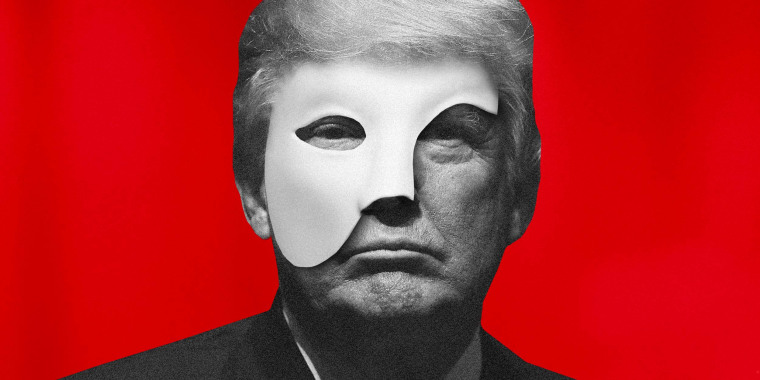Former White House press secretary Stephanie Grisham is the latest ex-Trump staffer to pen a tell-all book. Her version of events, “I’ll Take Your Questions Now,” is coming out next week — and early excerpts have given us what may be the most benignly weird anecdote of the Trump era.
Here’s how The New York Times frames the revelation that then-President Donald Trump’s staff had a protocol in place to help temper his frequent rages:
At one point, she writes, Mr. Trump’s handlers designated an unnamed White House official known as the “Music Man” to play him his favorite show tunes, including “Memory” from “Cats,” to pull him from the brink of rage. (The aide, it is revealed later, is Ms. Grisham’s ex-boyfriend. She does not identify him, but it is Max Miller, a former White House official now running for Congress with Mr. Trump’s support.)
First off, I just want to note that this may be the most relatable that Trump has ever been to me, personally. What Grisham describes may be the greatest unheralded perk of the presidency. Imagine that every time you were in a bad mood, you had a designated person whose job it was to play show tunes until you feel better. It’s basically the Broadway version of the scene in the 2015 movie “Avengers: Age of Ultron” in which Black Widow (Scarlett Johannson) calms down the Incredible Hulk (Mark Ruffalo).
Now, we don’t know exactly which Broadway standards Miller played for Trump to lower his adrenaline. Personally, I’d love to learn that there were some really esoteric choices such as “Pippin” or “Kiss Me, Kate.” (Given the booing the audience directed at his vice president-elect in 2016, I think we can rule out “Hamilton.”) But based on what we’ve known about Trump’s musical taste for years now, I think we can guess that it features the works of British playwright and composer Andrew Lloyd Webber.
Imagine that every time you’re in a bad mood, you had a designated person whose job it was to play showtunes until you feel better.
See, for all the surprised tweets that this tidbit inspired, “Memory” has been part of Trump’s political persona since before he was president. When he was first running for the GOP nomination in 2016, Trump's campaign playlist featured two Broadway show tunes on it: the aforementioned “Memory” and “Music of the Night” from “Phantom of the Opera.”
When MSNBC was covering the primaries in January 2016, reporter Alex Seitz-Wald — who had been covering the Democratic race — cited Trump’s use of show tunes at his rallies as “easily the most surprising bit” of his week following the GOP candidates on the trail.
The 2020 version of the playlist — oddity that it was — kept those two songs on the nightly rundown. But as Dara Lind reported in 2016, his love of Webber goes beyond those two songs. His 2004 book “Think Like a Billionaire” featured a callout to a show that fits his personality perfectly:
My favorite Broadway show is Evita by Andrew Lloyd Webber, starring Patti LuPone. I saw it six times, mostly with Ivana. Evita is not on Broadway right now, but I'm hopeful that they'll bring it back. Also, The Phantom of the Opera was great!
As Lind pointed out at the time, Webber and Trump are basically made for each other. Webber’s oeuvre — especially following the breakout success of rock opera “Jesus Christ Superstar” — lives and breathes for spectacle. Everything is overwrought, melodramatic, turned up to 11 on the amp in a Webber show. If there isn’t a parade of dancing cats following the loosest plot heretofore discovered by man, there’s an entire chandelier crashing on stage, and a legion of exhausted first sopranos strewn in his wake.
It’s also extra delicious that “Evita” — the story of an entertainer turned political star who lulls the masses with populism as cover for building a dictatorship — is his favorite show. (I would love to ask Ms. LuPone one day how she feels about that and his love of her performance.) “As a speech by a megalomaniac woman attempting to bamboozle half a million people, it is right on the button; it is meant to be low on content and high on emotion, just like Evita herself,” Lind quotes lyricist Tim Rice as writing about “Don’t Cry for Me Argentina,” the defining number of the show.
And finally, this is just one more data point supporting the theory that Trump is permanently frozen in the 1980s, the time where he was at his peak mentally, professionally, and as an icon in American culture. In that era, his affairs were fodder for tabloids, he had yet to bankrupt his casino, and his views on American competition in the world were fully developed. And Webber was the composer of that time period.
Webber’s shows were outrageously popular with the general public to the point of sparking backlash from the more “cultured” theater crowd. It’s small wonder that Trump, the king of the gilded class, took such a shine to the drama that Webber provided. And that even 40 years later, the belting of a former glamour cat was so useful in taking him out of his fury, he could remember the time he knew what happiness was and let the memory live again.

